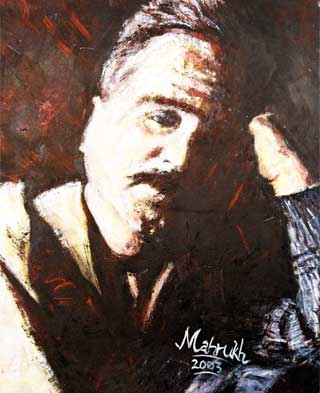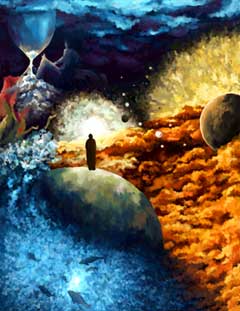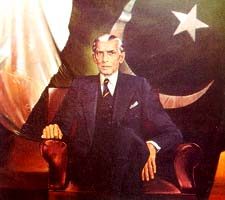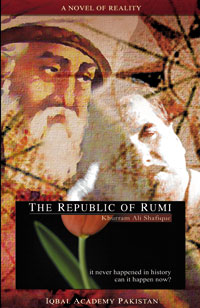Iqbal was not a philosopher in the Western sense of the word but in the Eastern sense. He never claimed to have a system of philosophy in the same sense as Kant or Hegel had theirs (he categorically denied this during his visits to Europe in the early 1930’s). Instead, he claimed his intellectual descent from Muslim sages like Sanai, ’Attar and Rumi (in Gabriel’s Wing he even quotes a verse popularly attributed to Rumi, which says, “We are coming after Sanai and ’Attar”). Hence, the distinct worldview that he had was presented in the organic, holistic structure known for such discourses in the East and not delineated in the mechanical manner common in the West. Philosophers, Western or Eastern, try to answer some questions (and not all questions, as sometimes misunderstood by the followers of Iqbal). There are three basic questions that Iqbal tried to answer.
As we have seen, the most important premise in his thought is the unity of the human race, rooted in the Oneness of its Creator, and the divine in each human being. The very thought of humanity could drive him to ecstasy. Transformation of an individual soul into something larger than itself was the common goal of all mystics, but while some of the earlier ones had preached fulfillment through annihilation into the Divine Self – proclaiming that a drop becomes an ocean by becoming a part of it – Iqbal declared that the individual ego must seek its expansion through union with the collective ego of the group. Today, the gurus of human resource management are devising workshops for suggesting that competition within an organization, which was once regarded as the healthiest form of motivation, is an outdated monstrosity that must be replaced with the gentler incentives based on the idea that the world has enough resources to make everyone happy. The human resource experts must primarily think in terms of organizations and small groups. It takes a world philosopher to raise our vision to the level where we can suddenly realize that our ideas need not be restricted to small groups but may be applied to the entire humanity. Cooperative learning is not for classrooms only – how about applying it to the heads at Geneva? Win/win approach is not for boardrooms only – what could the world not achieve if this became the rule for international treaties? We need a world class thinker to provide sufficient drive for developing such a conviction in our hearts and minds. Iqbal is one such thinker. He employs the trickiest, shrewdest, loveliest possible wordplay to convince his listeners that if political leaders can talk in terms of eradicating illiteracy and poverty in their own countries then why can’t someone talk about wiping out the evils from the face of the entire globe? If one leader can’t do that, then many should get together – or maybe all should get together. What the scientists of management are today showing us as possible, convenient and reasonable at micro level is also possible, convenient and reasonable at macro level. It may sound strange but it might be true that among the great modern thinkers with any claim to universality, Iqbal is perhaps the only one whose thought can provide a profound philosophical foundation for building a super structure of global solutions from the ideas gaining popularity on a grass-root level in our times. This is the difference Iqbal can make to our world. His belief in a common human future was far ahead of his times to be understood then and it is no surprise that it was mistaken for something else, something smaller. Today his voice can bring a paradigm shift in the way we see ourselves and our world.
There have been many poets but few can be credited with the birth of a civilization. Homer and Iqbal are two cases in point. The works of such poets not only stand in their own right but also provide a rational context for making sense of the civilizations that spring out of them. The Homeric poetry is not only a reference for the Greek poets and playwrights that came after him but also for the exploits of Alexander of Macedon, who was driven by a larger than life ambition to live out the Homeric ideals. The genetic code of Pakistan — the state as well as the civilization — is contained in the works of Iqbal. To these we must refer with an objective mind. Pakistan is now been around for long enough that its history could become a dependable reference. The future course of action in this country may be charted out now in the light of its past experiences since 1947. As Iqbal is the ideological founding father of the nation, the relevance of his thought should also be determined in the light of this recent history. Firstly, let’s look at the way the society has changed since the days of Iqbal. The British have gone and we are independent. On the flip side, it also means that the magnificent infra structure of the Raj – receiving sustenance directly or indirectly from centuries of political and administrative experience of the British – is gone too. Many things that Iqbal took for granted – such as democracy, cultural pluralism, a certain degree of tolerance, and efficient governance – now need to be rediscovered through our own effort. We need to readjust his thought to this situation. Secondly, it is often overlooked that the Muslim “community” mentioned by Iqbal might not be the same as the Muslim “state” that we now have in our hands. The state, in the modern political sense, tends to become a Frankenstein monster, and it was this exploitative business against which Iqbal complained when he described patriotism as a false god of the new age. The give and take between an individual and the community is transparent and immediate, whereas the totalitarian tendency of the state dictates a different ballgame. It creates a mystique and introduces blinkers in the name of security concerns, very often without even explaining them to the citizen. Just as religion was abused by the rulers for exploiting the common people in the medieval age, so the mystique of the modern state may be abused by the ruling elites, whoever they may be. Iqbal’s concept of a separate homeland for the Muslims on “communal” lines was driven by a desire to avoid precisely the kind of games that were later played in Pakistan by some wielders of power. One can be sure that the denial of human dignity in the name of state necessity would be shirk in the eyes of Iqbal, and he would say that it amounts to making the state a partner with God. It is true that the transformation of the community into a state was inevitable once the state was established, but the regrettable fact is that this transformation happened mostly at the hands of non-professionals. Bad politicians, bureaucrats and military adventurists could hardly be looked upon to accomplish a task that was more challenging than running any other state in the world, for this was a state that was to present a model against the common trends of the age. The very point in having Pakistan was to defeat the idea of geographical divisions in the world, and to lead the humanity in discovering a universal spiritual democracy. To match the task were needed, not just good leaders, but extraordinary ones. Unfortunately, the people at the helm of things in Pakistan for a very long time were the complete antithesis of what was desirable – when Iqbal’s younger son Javid met one of the dictators who ruled over Pakistan in its early phase, he was extended courtesy but was told that his services were not required since he was a gentleman. “We are looking for rascals,” the ruler said to Javid in just so many words. Great leaders, at least in a democratic context, can only come up when the people are empowered and mindful of their civil liberties. Thirdly, the Pakistani society has remained divided on the issue whether Islam should have an official role in the state or not. This divide between the “liberals” and the “conservatives” has caused a deplorable waste of political energies and intellectual talent. It is not even diversity of opinion as may be desired by the society. It is disintegration. There is no attempt of meaningful dialogue between these opposing schools of thought. Perhaps a common ground could be reached if both sides were willing to accept the humanity of the other, and focused on solving the real problems of the common people of the country rather than fighting over names and icons. For Pakistan, Iqbal could mean a much-needed compromise in this heated debate. He supported the legitimacy of the Muslim law but focused on the eradication of poverty and injustice. The Iqbal scholars should now do something to bring him into the higher avenues of discourse in the region, which has remained aloof from him since 1947. This can only be done if we stop projecting our own ideologies on him and allow him to come out as what he was.
The study of Iqbal suffers greatly from a decadent trend peculiar to the East. Here, even original ideas are often presented by way of “commentaries” on past masters. A classic example of this was Iqbal’s hero Al-Jili himself, whose perception of wahdatul wujud notably differed from Ibn ‘Arabi, yet his ideas were paraded as commentaries on the Spanish mystic. Likewise, a careful study of the enormous bulk of the so-called “thought of Iqbal” literature would show that so many ideas presented by his interpreters have no foundation in his writings. A thinker of Iqbal’s stature should have spawned a school of thought, or several schools of thought, claiming their descent from him but giving birth to entire generations of independent thinkers. One is overwhelmed by the sense of waste considering that the intellectual face of Pakistan could have been different if these countless “commentators” had taken the sensible step of coming out on their own. Just how many independent social scientists and thinkers we could have had if instead of wasting their energies in proving their ideas with insufficient references to Iqbal they had tested and proven those new ideas against the rules of logic, reasoning and common sense! Good results may come out if commentaries on Iqbal are restricted to those issues that he himself chose as topics or sub-topics, and preferably on which he left substantial amount of writings from every period in his life, so that we can not only see the progression of his thought but also be sure that what he was saying on these subjects was not a fleeting comment that could be misunderstood but a product of his independent thinking over a considerable period of time. For instance, there are such themes as Time, education, law, and so on, which Iqbal touched upon in his poetry and prose but did not cover comprehensively. To claim that one knows the complete picture of these concepts as it existed in Iqbal’s mind is not scholarship but clairvoyance. A good deal of energy currently wasted away in writing far-flung explanations could be directed towards independent thinking on important issues which we face today. The fundamental principles of Iqbal’s approach – infallible belief in the glory of the human soul and a healthy spiritual sensitivity – could be used as starting points for approaching the issues of modern life but let there be new ideas. Let there be more thinkers. However, the difference between presenting something on your own authority and forging it in the name of a past master is actually the difference between two entirely different intellectual settings. To make a statement in your own name you need to be in a society where critical thinking and originality is valued, and people are open-minded and look forward to new ideas. You can present the same stuff but with reference to someone dead for ages if you are living in a society where critical thinking and originality are considered blasphemous, people are morally insecure and look backward on their past in order to avoid responsibility for their own actions. Regardless of the impediments in the intellectual make-up of their society, the Pakistani people today carry the immense responsibility of making the voice of Iqbal heard across the globe: today the world needs to hear him more than ever before. Previous | Contents | Next |
|||||||||||
 Special
thanks to
Special
thanks to 



